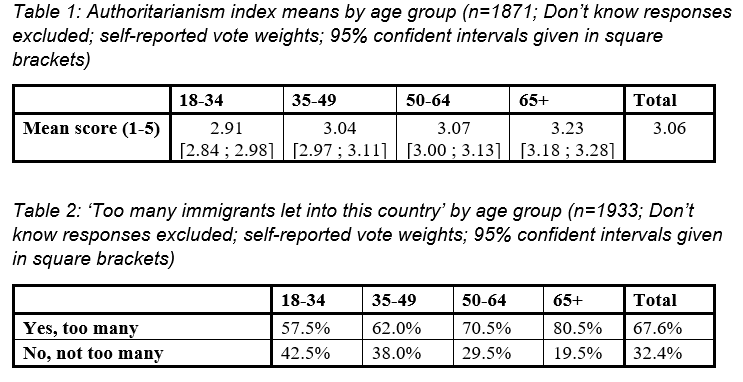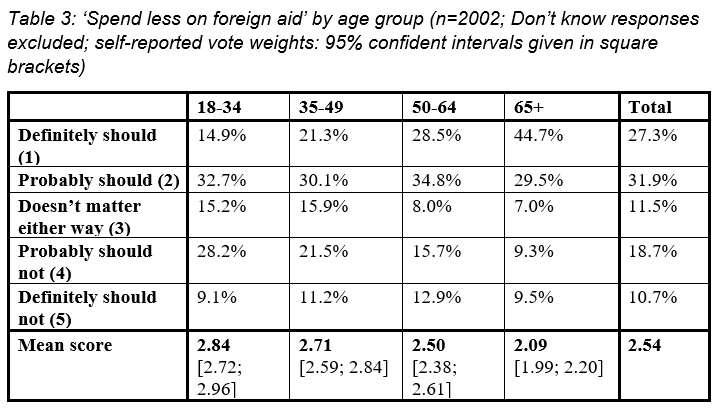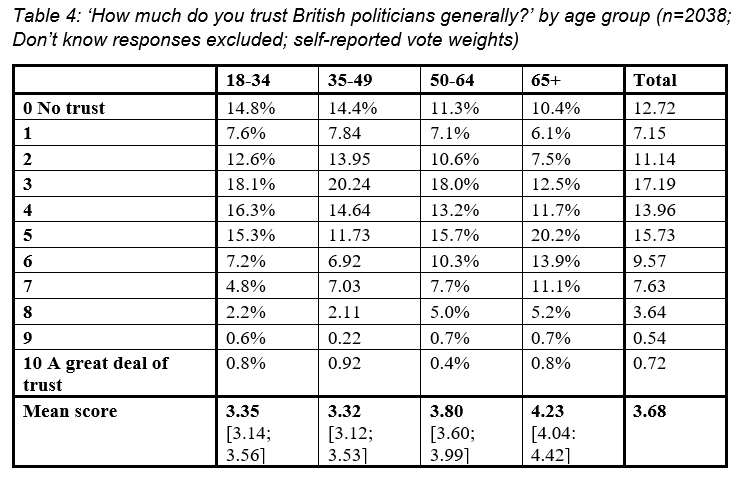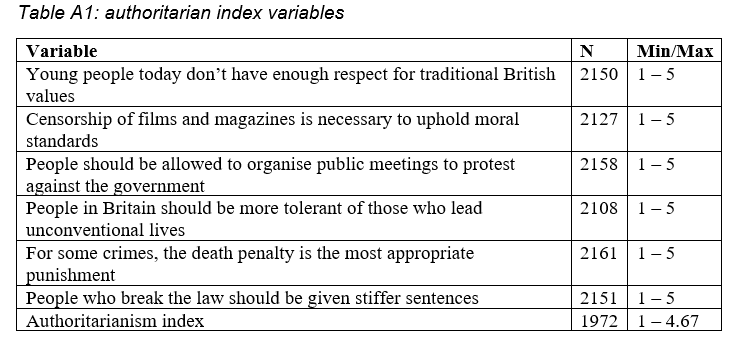Nick Pearce is Professor of Public Policy and Director of the Institute for Policy Research (IPR) at the University of Bath. Joe Chrisp is a PhD candidate in the IPR and Department of Social and Policy Sciences at the University of Bath.
Explanations of why people voted for Brexit, Donald Trump or so-called populist parties in the EU are often characterised as either ‘cultural’ or ‘economic’ – that is, values or identity-based, versus social class or economic, explanations. One of the most important recent examples of the former is the work of Ronald Inglehart and Pippa Norris(1). Their ‘cultural backlash’ thesis maintains that recent populist votes such as Brexit represent a conservative reaction against the ‘silent revolution’ in the cultural values of advanced societies like the UK towards social liberalism.
Western societies have become more socially liberal on many issues and this has stimulated a backlash amongst voters holding authoritarian and conservative values. These values are strongest amongst older birth cohorts, particularly the interwar generation. In post-industrial areas characterised by low income and high unemployment, the authoritarian reflex against cultural change is accelerated by economic insecurity; material hardship sharpens the appeal of authoritarian-populist actors and anti-immigrant, anti-elite sentiments. But fundamentally, it is cultural values, not class or economics, that explains the age differences in vote choice.
We can explore these claims for the UK using data from the British Election Study (BES). Tables 1-3 show data from the BES post-election face-to-face survey in 2017 that relate to the cultural values cited by Inglehart and Norris. Firstly, we construct an authoritarianism index using the survey questions designed by BES to measure authoritarian-libertarian values (shown in Table A1)(2). The scales are summed and then divided by the number of survey questions (6) to give an index with possible scores between 1 and 5. Table 1 shows that older people are on average significantly more authoritarian than younger age groups. As Inglehart and Norris argue, these values are also reflected in policy preferences related to immigration and global governance. Table 2 shows that older people are considerably more likely to think that there has been too much immigration in the UK, while Table 3 shows that age predicts not only Euroscepticism but another dimension to distrust of global governance: opposition to foreign aid spending. Nearly half of over 65s think that government definitely should spend less on foreign aid compared to only roughly 15% of 18-34 year olds.


All of these indicators of cultural values and policy preferences correlate strongly with voting for both Brexit and the Conservative Party at the 2017 general election, reinforcing the argument that these values and vote choice are fundamentally related to each other. However, these values and preferences can be caused by ageing, period and cohort effects(3). Older generations are indeed more Eurosceptic and/or authoritarian, whether because they grew up in a more conservative and a less globalised era outside of the European Union or because of compositional characteristics such as having lower levels of education, which is a consistent predictor of more authoritarian values.
On the other hand, individuals also tend to get more Eurosceptic, conservative and authoritarian as they get older, and when it comes to vote choice, period or time effects - for example, prevailing macro-economic conditions - matter considerably to political outcomes. In Eichengreen et al’s recent study of attitudes towards the EU since the early 1960s, the period effects swamp both cohort and ageing effects(4).
In addition, as Inglehart and Norris acknowledge, there is a mixed cross-national picture when it comes to the strength of age in predicting populist values or political mistrust. Although they find older people in the UK are more distrustful of politicians and political institutions, the BES post-election survey data indicates the opposite. This data also highlights an important distinction between the EU referendum and the 2017 general election.

Table 4 shows the proportion of each age group that placed themselves on a scale of 0-10 in response to the question “How much do you trust British politicians generally?” - with 0 representing ‘no trust’ and 10 representing ‘a great deal of trust’ (the means and 95% confidence intervals are also displayed in the final row). Those aged 18-34 and 35-49 are similarly distrustful of politicians, while those aged 50-64 trust politicians slightly more and those over 65 even more still. Leave voters(5) were less likely to trust British politicians generally than Remain voters, implying that older people voted for Brexit in spite of their greater trust in politicians than younger voters.
However, in the 2017 general election, we find that Conservative voters were much more likely to trust British politicians generally than Labour voters, Liberal Democrat voters, voters of other parties combined, or non-voters - suggesting that the success of the Conservative Party among older voters cannot be construed as a cultural backlash associated with a (populist) distrust of the political class(6).
A more fundamental critique of the ‘cultural backlash’ thesis is that it abstracts ‘values’ from the political economy in which they are generated or determined. We may be able to measure an individual’s cultural values or social class position through surveys, but we should not erect a dichotomous social ontology on that basis. Thus in forthcoming work, we engage with the question of the political economy of older people’s values and voter preferences: i.e, do older people have distinct material interests by virtue of their position in the lifecycle, their particular cohorts’ patterns of home and asset ownership, and the recent ‘period’ effects of austerity and its aftermath?
Our answer is that in an ageing society like the UK, that has very significant intergenerational inequalities in home ownership and welfare entitlements that have been sharpened by policy during austerity, there is indeed a distinct political economy of age – and not simply a values based generational divide.

(1) R. Inglehart and P. Norris, Cultural Backlash: Trump, Brexit, and Authoritarian Populism, Cambridge: Cambridge University Press, 2019.
(2) The items that form this index are marginally different from the items used by Inglehart & Norris to explain the EU referendum vote as they use data from the BES Internet Panel. 4 of the items are identical and the 2 that are different are starred in Table A1.
(3) I. Down, and C. J. Wilson, A rising generation of Europeans? Life-cycle and cohort effects on support for “Europe.” European Journal of Political Research, 52(4), 2013, pp431–456; I. Down, and C. J. Wilson, A rising generation of Europeans? Revisited. European Journal of Political Research, 56(1), 2017, pp 199–214; B. Eichengreen, R. Mari, G.Thwaites, and P. Rehm, Will Brexit Age Well? Cohorts, Seasoning and the Age-Leave Gradient, Past, Present and Future. SSRN, October 2018; S. Fox and S. Pearce, The generational decay of Euroscepticism in the UK and the EU referendum. Journal of Elections, Public Opinion and Parties, 28(1), 2018, 19–37; J. Tilley, and G. Evans, Ageing and generational effects on vote choice: Combining cross-sectional and panel data to estimate APC effects, Electoral Studies 33, 2014, pp19–27.
(4) Eichengreen et al, ‘Will Brexit age well?’
(5) As recalled in the BES 2017 post-election survey.
(6) The means on the scales were 4.54 for Conservative voters, 3.59 for Labour voters 3.75 for Liberal Democrat voters, 3.12 for voters of other parties combined and 3,01 for non-voters.
Respond




